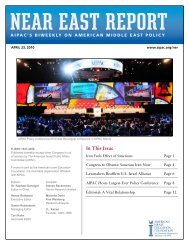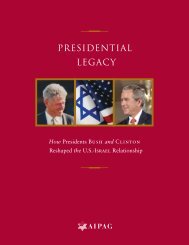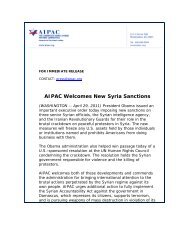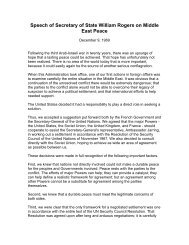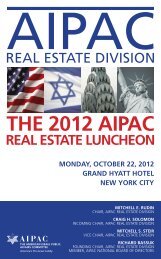2013 Briefing Book - Print Version - Aipac
2013 Briefing Book - Print Version - Aipac
2013 Briefing Book - Print Version - Aipac
Create successful ePaper yourself
Turn your PDF publications into a flip-book with our unique Google optimized e-Paper software.
WHY ISRAEL MATTERS<br />
What Congress Has Done to Support Israeli<br />
Humanitarian Efforts<br />
Supported Regional Cooperation on Health and Environmental Issues. Created in 1979 in<br />
the wake of the peace agreement between Israel and Egypt, the Middle East Regional<br />
Cooperation Program (MERC) has sought to promote scientific cooperation between<br />
Arab and Israeli researchers, students and communities. Previous projects involving<br />
Israel, the Palestinians, Egypt, Jordan, Morocco and Tunisia have focused on issues<br />
such as water, health, agriculture and the environment. Funded by the United States<br />
Agency for International Development (USAID) since its inception at an annual level of<br />
$5 million to $7 million, the MERC Program unites Israel’s technological prowess with<br />
its quest for peace with its Arab neighbors.<br />
Backed U.S.-Israeli Programs in Developing Countries. Founded in 1988, the<br />
Cooperative Development Program (CDP) funds the collaborative research of<br />
American and Israeli scientists working with their counterparts in developing<br />
countries throughout the world in order to improve their conditions. Projects take<br />
place in Latin America, Asia, Africa, Eastern and Central Europe, as well as in some<br />
of Israel’s neighboring countries. Activities include training in arid lands agriculture,<br />
livestock, exotic crops and irrigation. Both America and Israel contribute funding to<br />
the CDP.<br />
Supported Joint Technological Development. Congress supported the creation of the<br />
U.S.-Israel Binational Agricultural Research and Development Foundation (BARD)<br />
in 1977 by appropriating $40 million for an initial endowment, fully matched by<br />
Israel. The endowment was augmented in 1984 with a contribution of $15 million,<br />
again matched by Israel, but has not been replenished since. This severely restricts<br />
BARD’s ability to continue funding cutting-edge research and development into<br />
agricultural technologies that assist programs in arid land development, water<br />
treatment, food safety and other vital areas.<br />
34



